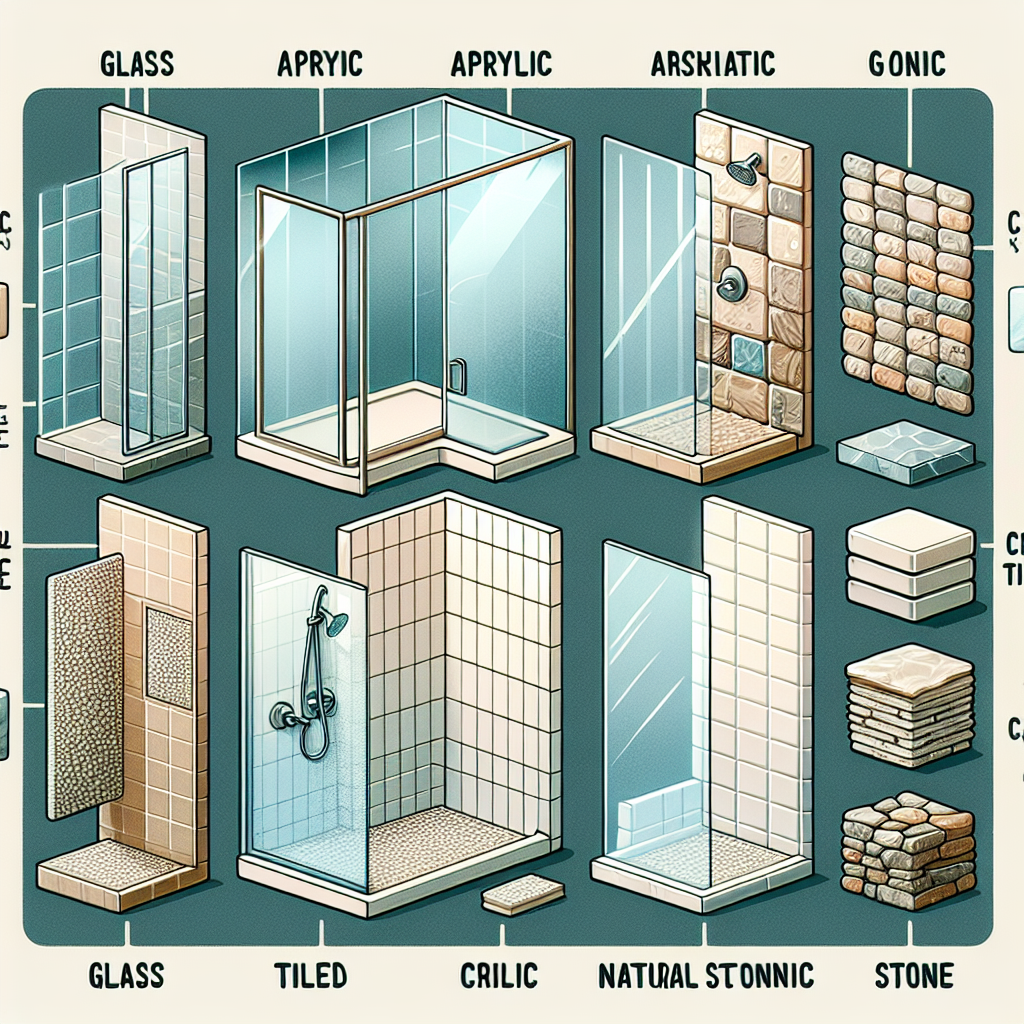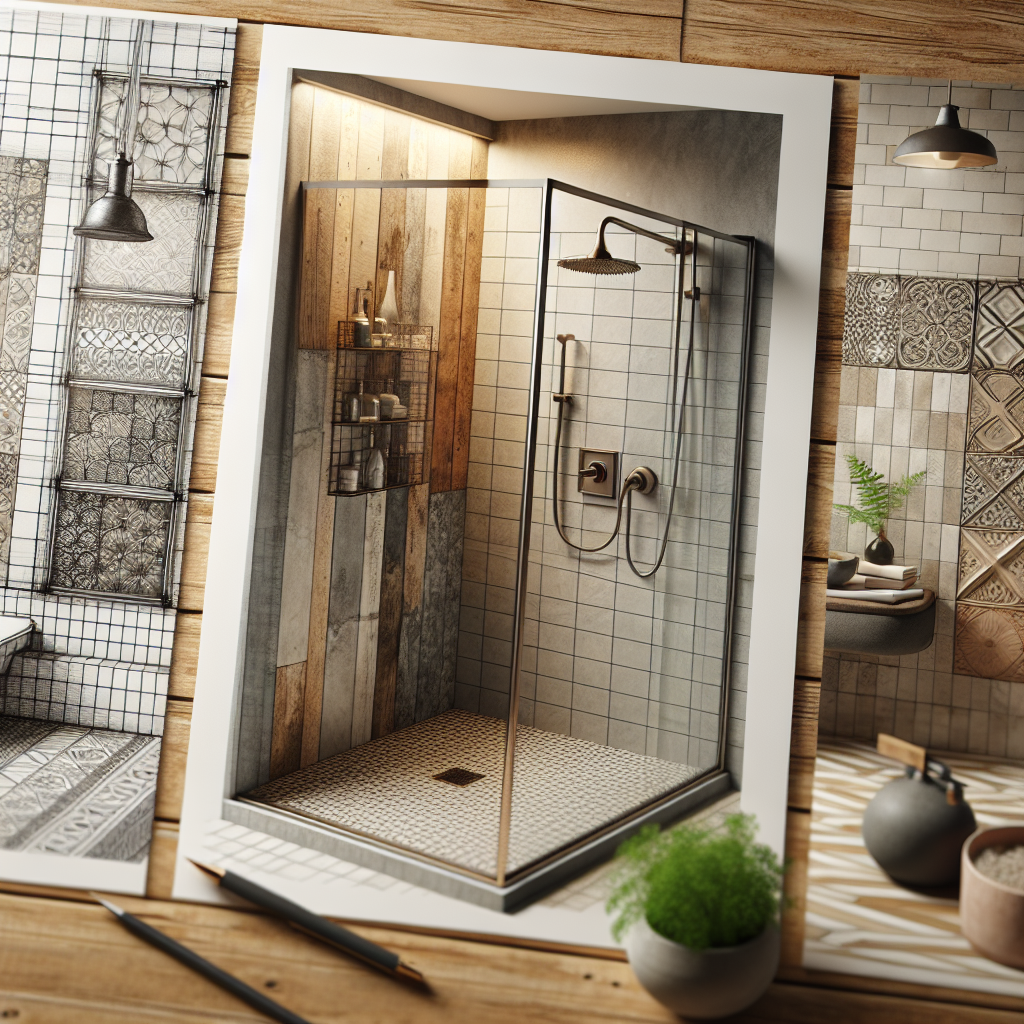Shower Enclosure Materials: A Comprehensive Guide

When it comes to designing a bathroom, one of the key elements to consider is the shower enclosure. Not only does it play a functional role in keeping water contained, but it also contributes to the overall aesthetic appeal of the space. With a wide range of materials available for shower enclosures, it can be overwhelming to choose the right one for your needs. In this article, we will explore the different shower enclosure materials, their pros and cons, and provide valuable insights to help you make an informed decision.
Types of Shower Enclosure Materials
There are several materials commonly used for shower enclosures, each with its own unique characteristics and benefits. Let’s take a closer look at some of the most popular options:
1. Glass
Glass is a timeless and elegant choice for shower enclosures. It offers a sleek and modern look that can enhance the overall aesthetic of any bathroom. Glass enclosures are available in various thicknesses, ranging from 3/8″ to 1/2″, and can be clear, frosted, or patterned. One of the main advantages of glass enclosures is their ability to create an open and spacious feel in the bathroom, as they allow light to pass through. Additionally, glass is easy to clean and maintain, making it a popular choice for many homeowners.
However, it’s important to note that glass enclosures can be more expensive compared to other materials. They also require regular cleaning to prevent water spots and soap scum from building up. Furthermore, if not properly installed, glass enclosures can be prone to leaks.
2. Acrylic
Acrylic is a lightweight and affordable option for shower enclosures. It is a type of plastic that is highly durable and resistant to scratches and stains. Acrylic enclosures are available in a variety of colors and finishes, allowing for customization to match any bathroom decor. They are also easy to install and maintain, making them a popular choice for DIY enthusiasts.
One of the main advantages of acrylic enclosures is their excellent insulation properties. They retain heat better than glass, resulting in a warmer showering experience. Acrylic is also less prone to shattering compared to glass, making it a safer option, especially for households with children.
However, acrylic enclosures may not offer the same level of elegance and sophistication as glass. Over time, they can become discolored and may require replacement. Additionally, acrylic is more susceptible to scratches, so it’s important to use non-abrasive cleaners when cleaning the enclosure.
3. Tile
Tile is a versatile and customizable material for shower enclosures. It allows for endless design possibilities, as it comes in a wide range of colors, patterns, and textures. Tile enclosures can create a luxurious and spa-like atmosphere in the bathroom, adding value to the overall aesthetic appeal of the space.
One of the main advantages of tile enclosures is their durability. When properly installed and maintained, tile can last for many years. It is also resistant to water damage and easy to clean. In case of any damage or wear, individual tiles can be replaced without having to replace the entire enclosure.
However, tile enclosures can be more expensive and time-consuming to install compared to other materials. The grout lines between the tiles require regular cleaning to prevent mold and mildew growth. Additionally, if not properly sealed, tile enclosures can be prone to leaks.
4. Stone
Stone is a luxurious and natural choice for shower enclosures. It adds a touch of elegance and sophistication to any bathroom. Stone enclosures are available in various options, such as marble, granite, and travertine, each with its own unique characteristics and patterns. They can create a spa-like atmosphere, providing a sense of relaxation and tranquility.
One of the main advantages of stone enclosures is their durability. They are resistant to scratches, stains, and water damage. Stone also retains heat well, resulting in a warm and comfortable showering experience. Additionally, stone enclosures can increase the value of a home, as they are considered a high-end feature.
However, stone enclosures can be more expensive compared to other materials. They require regular sealing to prevent staining and water damage. Stone is also heavy, so proper structural support is necessary during installation.
Frequently Asked Questions about Shower Enclosure Materials
1. What is the best material for a shower enclosure?
The best material for a shower enclosure depends on various factors, such as budget, aesthetic preferences, and maintenance requirements. Glass is a popular choice for its timeless elegance and easy maintenance. Acrylic is a more affordable option that offers excellent insulation properties. Tile and stone provide endless design possibilities and a luxurious feel, but they can be more expensive and require regular maintenance.
2. Are glass shower enclosures safe?
Glass shower enclosures are safe when properly installed and maintained. It’s important to choose tempered glass, which is stronger and less likely to shatter compared to regular glass. Additionally, installing a sturdy frame and using high-quality hardware can ensure the stability and safety of the enclosure.
3. How do I clean and maintain a shower enclosure?
The cleaning and maintenance requirements for a shower enclosure depend on the material used. Glass enclosures can be cleaned using a mixture of vinegar and water or a non-abrasive glass cleaner. Acrylic enclosures should be cleaned with a mild soap or acrylic cleaner and a soft cloth. Tile and stone enclosures require regular cleaning with a non-abrasive cleaner and periodic sealing to prevent staining and water damage.
4. Can I install a shower enclosure myself?
Installing a shower enclosure can be a complex task, especially if you have limited experience with plumbing and construction. It’s recommended to hire a professional contractor who specializes in bathroom renovations to ensure proper installation and avoid any potential issues or leaks.
5. How long do shower enclosures last?
The lifespan of a shower enclosure depends on various factors, such as the material used, quality of installation, and maintenance. Glass enclosures can last for many years with proper care. Acrylic enclosures typically have a lifespan of 10-15 years. Tile and stone enclosures can last even longer, but may require occasional repairs or replacements.
Summary
Choosing the right material for your shower enclosure is an important decision that can greatly impact the functionality and aesthetic appeal of your bathroom. Glass offers a timeless elegance and easy maintenance, while acrylic provides affordability and excellent insulation properties. Tile and stone allow for endless design possibilities and a luxurious feel, but require more maintenance and can be more expensive. By considering your budget, preferences, and maintenance requirements, you can make an informed decision that suits your needs and enhances your overall showering experience.
For professional assistance with shower enclosure installation and bathroom renovations, North Bay Contractors can provide expert guidance and high-quality services.

